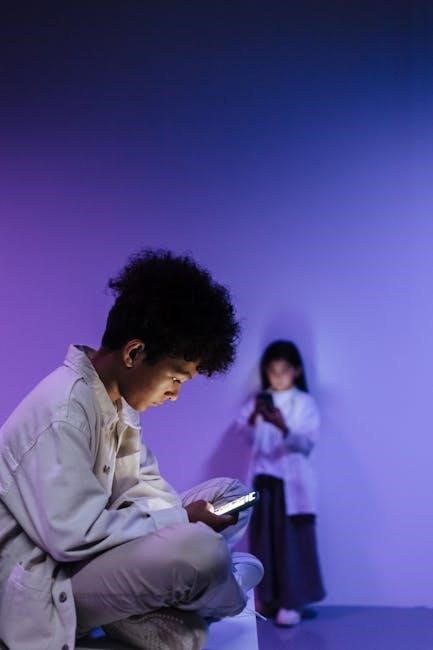Jean M. Twenge explores the profound impact of smartphones on Generation Z, highlighting mental health crises and societal shifts in her seminal work iGen.
1.1 Overview of the Article
Jean M. Twenge’s article, adapted from her book iGen, examines the profound impact of smartphones on Generation Z. She argues that excessive smartphone use has led to increased rates of anxiety, depression, and loneliness among teens. Twenge presents evidence from surveys and statistical data, showing a correlation between smartphone adoption and a decline in mental well-being. She also explores how digital connectivity has reshaped social interactions, identity formation, and cognitive development. The article raises critical questions about the long-term consequences of smartphone ubiquity, urging a reevaluation of how society supports young people in navigating this digital era.
1.2 Author Background and Credentials
Jean M. Twenge is a renowned psychologist and professor at San Diego State University, specializing in generational differences and mental health. Her work has extensively focused on how digital technology impacts young people. As the author of iGen, Twenge has conducted comprehensive research on Generation Z, analyzing trends in smartphone use and its effects on their development. Her credentials include numerous publications in top-tier journals and appearances in major media outlets, establishing her as a leading voice in understanding the intersection of technology and youth behavior. Her expertise provides a solid foundation for examining the smartphone’s influence on modern society.

The Impact of Smartphones on Mental Health
Smartphones have contributed to rising anxiety, depression, and a mental health crisis among teens, as highlighted by Jean Twenge’s research on Generation Z’s struggles with technology.
2.1 Increased Rates of Anxiety and Depression
The widespread use of smartphones has been linked to a significant rise in anxiety and depression among teenagers. Jean Twenge’s research highlights that Generation Z, growing up with constant connectivity, faces unprecedented mental health challenges. Studies indicate that excessive screen time and social media exposure correlate with higher levels of stress and emotional distress. Teens are more likely to experience feelings of inadequacy and isolation, exacerbating these conditions. The constant need for validation through likes and comments further intensifies anxiety. Twenge’s findings underscore the urgent need to address these issues and promote healthier smartphone habits to mitigate the growing mental health crisis.
2.2 Loneliness and Isolation in the Digital Age
Despite constant connectivity, smartphones have paradoxically fostered a sense of loneliness and isolation among young people. Jean Twenge’s research reveals that Generation Z spends less time engaging in face-to-face interactions, leading to weakened social bonds. Digital communication often lacks emotional depth, leaving individuals feeling disconnected. The rise of social media has created virtual communities that sometimes replace real-life relationships, further exacerbating feelings of isolation. This shift has profound implications for mental health, as genuine human connection is vital for emotional well-being. Twenge’s work emphasizes the need to strike a balance between technology use and meaningful interpersonal interactions to combat this growing issue.

Changes in Social Interaction
Smartphones have redefined social interaction, shifting from face-to-face conversations to digital exchanges, altering social norms and deepening feelings of isolation.
3.1 Decline of Face-to-Face Communication
The rise of smartphones has led to a significant decline in face-to-face communication, reshaping social dynamics and interpersonal relationships. Jean M. Twenge highlights how digital interactions have replaced physical ones, reducing empathy and deepening feelings of isolation. Generation Z, in particular, has grown accustomed to communicating through screens, leading to a decline in essential social skills. This shift has resulted in fewer meaningful connections, contributing to increased loneliness and anxiety. Twenge’s research emphasizes how this trend has profoundly impacted mental health, creating a generation more comfortable with virtual interactions than genuine human connection.
3.2 Cyberbullying and Online Harassment

Smartphones have enabled widespread cyberbullying and online harassment, particularly among teenagers. Jean M. Twenge’s research reveals that the constant connectivity provided by smartphones has exposed Generation Z to unprecedented levels of digital abuse. Cyberbullying has become a pervasive issue, with many teens experiencing emotional distress due to harsh online interactions. The anonymity of digital platforms exacerbates the problem, leading to severe psychological consequences. Twenge’s findings highlight how smartphones have created an environment where bullying is no longer confined to physical spaces, contributing to increased anxiety, depression, and feelings of isolation among young people.
Effects on Teenage Development
Smartphones have profoundly impacted teenage development, delaying maturity and complicating identity formation, leaving many young people unprepared for adulthood, according to Jean M. Twenge’s findings.
4.1 Delayed Maturity and Independence
Jean M. Twenge highlights how excessive smartphone use has led to delayed maturity and independence among teenagers. Many teens now lack essential life skills, such as problem-solving and decision-making, as they rely heavily on digital devices for guidance. This dependency has also shifted societal norms, with fewer teenagers engaging in traditional rites of passage, like obtaining a driver’s license or starting part-time jobs. The constant presence of smartphones has created a generation that is both physically and emotionally less prepared for adulthood, raising concerns about their ability to navigate real-world challenges independently. This trend underscores the broader societal impact of smartphone dominance.
4.2 Identity Formation in the Digital World
Smartphones have profoundly influenced how teenagers form their identities, with many turning to digital platforms for validation and self-expression. Social media shapes their sense of self, often prioritizing online personas over authentic, offline identities. This digital-centric identity formation can lead to confusion and anxiety, as teens struggle to reconcile their virtual and real-world selves. The constant pursuit of likes and followers creates pressure to conform to societal standards, undermining individuality. Additionally, the digital world’s immediacy and constant feedback loop can hinder teens’ ability to develop a stable, long-term sense of identity, leaving many feeling disconnected from their true selves.

The Role of Social Media
Social media has become a central aspect of life for Generation Z, shaping interactions, self-perception, and identity, while presenting both opportunities and challenges for youth development.
5.1 Impact on Self-Esteem and Body Image
Social media’s pervasive influence on Generation Z has profoundly shaped self-esteem and body image. Platforms like Instagram foster constant comparison, often leading to unrealistic expectations and a cult of perfectionism. Jean Twenge’s research highlights how teenagers, particularly girls, experience decreased self-esteem and heightened body dissatisfaction due to curated online content. This digital environment exacerbates insecurities, contributing to eating disorders, anxiety, and depression. The constant exposure to idealized images creates a cycle of self-doubt, further complicating the mental health challenges faced by this generation. Twenge emphasizes how these effects underscore the broader crisis of smartphone-induced psychological distress.
The rise of smartphones has cultivated a culture of relentless comparison and Fear of Missing Out (FOMO). Jean Twenge’s research reveals how Generation Z obsessively compares their lives to others’ highlight reels on social media. This constant need for validation fuels anxiety and dissatisfaction, as young people feel pressured to keep up with their peers’ accomplishments and experiences. FOMO exacerbates this phenomenon, driving a cycle of constant checking and engagement. Twenge argues that this mindset erodes genuine self-worth and fosters a sense of inadequacy, further entrenching the mental health challenges faced by this hyper-connected generation. Smartphones amplify these tendencies, intensifying the psychological toll. Smartphones significantly impact attention spans, reducing focus and hindering cognitive development. Jean Twenge highlights how constant distractions impair learning capabilities, affecting academic performance and critical thinking skills. Jean Twenge’s research indicates that smartphones have significantly reduced attention spans among Generation Z, leading to diminished focus and impaired cognitive development. The constant availability of digital content and notifications creates a culture of distraction, making it difficult for young people to engage in deep, sustained learning. Studies show that heavy smartphone users perform worse academically and exhibit weaker critical thinking skills compared to their peers. This trend raises concerns about the long-term impact on educational outcomes and intellectual growth, as smartphones redefine how young minds process and retain information in the digital age. The presence of smartphones in educational settings has become a contentious issue, with research indicating a correlation between smartphone use and decreased academic performance. Jean Twenge’s work highlights how the constant availability of smartphones leads to distractions, reducing students’ ability to focus during lessons. Additionally, the ease of access to non-educational content and social media further exacerbates the problem, creating a challenging environment for effective learning. Many educators now advocate for smartphone-free classrooms to foster better concentration and engagement, emphasizing the need for boundaries to maximize educational outcomes in a digitally saturated world. Striking a balance in smartphone use is crucial for mitigating negative impacts. Jean Twenge recommends setting boundaries, promoting mindful usage, and fostering offline interactions to ensure healthy digital habits. Jean Twenge emphasizes the importance of establishing boundaries to foster healthy smartphone habits. Encouraging physical activities, face-to-face interactions, and mindfulness can reduce excessive screen time. Parents and educators should model balanced behavior, creating phone-free zones and times, such as during meals or family gatherings. Implementing screen-time tracking tools and setting realistic limits can help users become more aware of their habits. By promoting a balanced approach, individuals can harness the benefits of technology while minimizing its negative effects on mental and social well-being. This proactive strategy is essential for ensuring smartphones serve as tools rather than distractions. Parents and educators play a crucial role in guiding healthy smartphone use among young people. They should lead by example, demonstrating balanced technology habits and fostering open conversations about digital life. Educators can integrate digital literacy into curricula, helping students understand the impact of smartphones on mental health and relationships. Parents should set clear guidelines, encouraging offline activities and face-to-face interactions. Collaborative efforts between home and school can create a supportive environment, ensuring that smartphones enhance rather than detract from a child’s development. By taking an active role, adults can help the next generation navigate the digital world responsibly and mindfully. Jean M. Twenge’s research highlights the critical impact of smartphones on Generation Z, emphasizing mental health challenges and the need for mindful technology use to ensure well-being. Jean M. Twenge’s research underscores the profound impact of smartphones on Generation Z, linking increased anxiety, depression, and loneliness to heavy device use. She highlights how prolonged screen time has contributed to delayed maturity, reduced face-to-face communication, and a rise in cyberbullying. Twenge also explores how digital identity formation affects self-esteem and mental well-being, emphasizing the need for balance in technology use. Her work, detailed in iGen, calls for greater awareness and mindful practices to mitigate the negative effects of smartphones on youth development and societal health. Jean M. Twenge’s findings suggest a critical need for balance between technology use and mental well-being in future generations. As smartphones continue to evolve, fostering digital literacy and mindful consumption will be essential. Parents and educators must play active roles in guiding healthy habits, while policymakers may need to implement safeguards to protect youth from harmful effects. The future likely holds both challenges and opportunities, emphasizing the importance of adaptability and resilience in navigating an increasingly digital world while preserving essential human connections and emotional health.5.2 The Culture of Comparison and FOMO

Academic and Cognitive Effects
6.1 Attention Span and Learning Capabilities
6.2 Smartphones in the Classroom

The Importance of Balance and Solutions
7.1 Promoting Healthy Smartphone Use
7.2 The Role of Parents and Educators
8.1 Recap of Key Findings
8.2 Implications for the Future